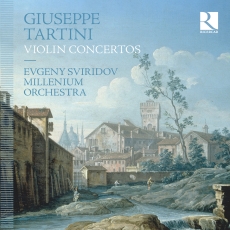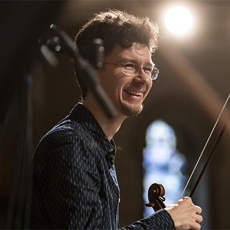Evgeny Sviridov - Giuseppe Tartini: Violin Concertos - MusicWeb International
It seems like a long time since I heard any Tartini; and certainly the 250th anniversary of his death in February 1770 – almost nine months before Beethoven’s birth – had, I confess, entirely passed me by. More even than most other eighteenth-century Italian masters, Tartini, his once ubiquitous “Devil’s Trill” apart, has perhaps been too easy to categorize as a kind of poor man’s Vivaldi. In fact, though, not only was he fourteen years younger than the Red Priest, but he also survived him by nearly thirty. And in this new selection of five violin concertos (selected from over 130), one really can hear him straddling two eras. The E minor and G minor concertos are undeniably reminiscent of Vivaldi, though with Tartini’s trademark chromaticism and rather longer-breathed melodies often to the fore. When listening to the D major and E major works that frame Evgeny Sviridov’s programme, though, I was surprised how often my mind made at least fleeting links with C.P.E. or, perhaps particularly, J.C. Bach – these concertos’ simpler, elegant, if perhaps also more soloist-centred manners seem very much to anticipate, even reflect, the early classical galant style.
As it happens, Germany is a valid and useful point of reference for Tartini’s career in general and for the works on this CD in particular. He was very popular in Germany, and is known to have come into contact with several German musicians on a visit to Prague between 1723 and 1726. Moreover the current disc affords some fascinating glimpses into what one might call the eighteenth-century German reception of Tartini. The version of the D major concerto (D. 24) that Sviridov plays is taken from a manuscript, now in Berlin, that features a very different orchestral accompaniment – including, for example, two horns – than what is thought to be Tartini’s own, as well as a third-movement cadenza attributed to the Dresden-based violinist and composer Johann Georg Pisendel (1687–1755). Meanwhile the A major concerto (D. 89) is played using an edition based on a Dresden manuscript that was demonstrably copied by Pisendel, and features his embellishments of the solo violin part, as well as a different ending to the cantabile second movement. Given that Sviridov also incorporates into two movements brief capriccios by either Tartini or his pupil Pietro Nardini (1722–93), it is both surprising and in its way refreshing that Ricercar at no point trumpets the presence of any “world premiere recordings”. The musical interest of these innovations is, after all, more than sufficient to speak for itself.
The St Petersburg-born, Cologne-based violinist Evgeny Sviridov is still only 31, but already has a distinguished career as both musicologist and performer. He plays a 1732 Gagliano, no less, and its tone is consistently sweet and generous. He is well up to the very considerable technical demands of these concertos, but always makes the listener primarily aware of their, and his, abundant lyrical qualities – prominent not least in the five slow movements, of which the Largo of D. 55 is an especially toothsome example. Indeed, one is often struck by the fact that, for all Tartini’s celebrated skill as an executant violinist, he never overeggs the showily virtuosic pudding in a way that Vivaldi himself can do, for example in some of the concertos of La Stravaganza.
Tartini’s violin concertos are not spectacularly well represented on record, but they have not been entirely neglected either. None of these selections, however, contains any of the concertos recorded by Sviridov – a tribute, no doubt, to his and Ricercar’s sagacious planning, as well as to the sheer number of concertos available to choose from. Up to a point, then, Sviridov has his chosen field to himself. Given this, and the quality both of the performances and of the scholarship underlying them, this is a disc with a lot going for it. As long as you remember to turn the volume down.

